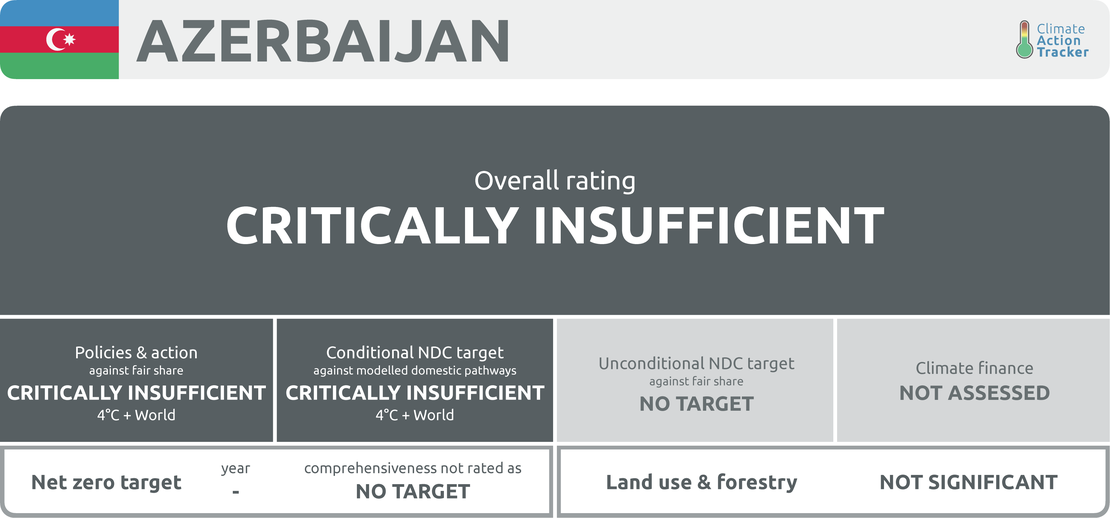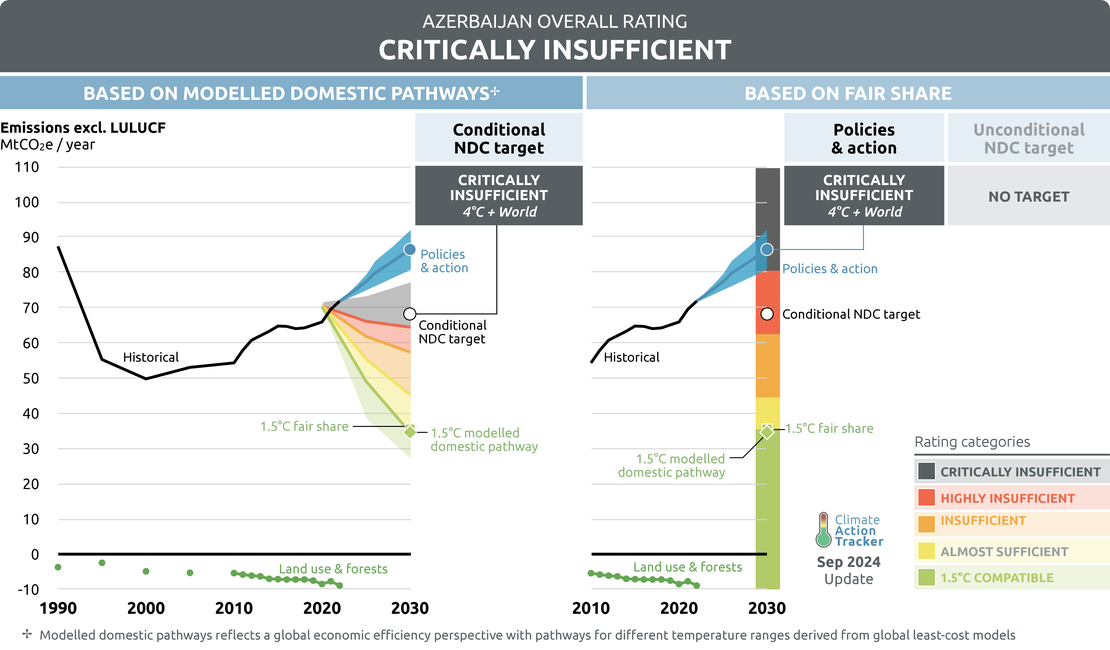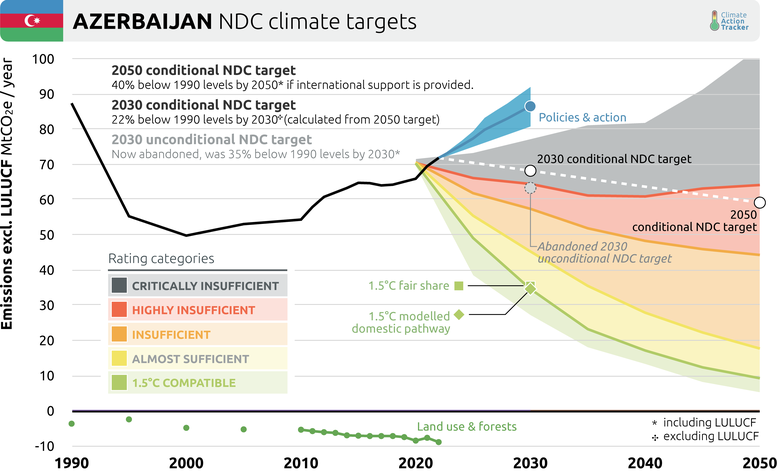The CAT rates COP29 host Azerbaijan's climate action "Critically insufficient"
Attachments

The CAT has undertaken a full country analysis of COP29 host Azerbaijan’s climate action
Overall, Azerbaijan’s target and current policies are far from consistent with the Paris Agreement’s 1.5°C temperature limit. Total GHG emissions are projected to continue rising by around 20% to 2030, in stark contrast to the emissions reductions necessary to meet its climate commitments. Energy-related methane emissions are increasing quickly, whereas for 1.5°C alignment they would need to drop by about 66% below 2020 levels by 2030.
Azerbaijan appears to have abandoned its 2030 emissions target, moving backward instead of forward on climate action. Its renewable energy targets remain weak. Azerbaijan’s economy is dependent on fossil fuel production and the government plans to increase fossil gas extraction by more than 30% over the coming decade. Emissions from exported fossil fuels are twice as high as domestic emissions.
Along with setting a more stringent climate target, Azerbaijan needs to significantly increase the ambition of its climate policies to reverse the present rapid growth in emissions and set its emissions on a firm downward trajectory. Overall, we rate Azerbaijan's climate action as "Critically insufficient."
Azerbaijan’s climate targets
Azerbaijan is among a tiny group of countries that has actually weakened its climate target in contradiction of the requirement of the Paris Agreement’s Article 4.3 that each Nationally Determined Contributions (NDCs) submission will be more ambitious than its previous one. Azerbaijan's latest NDC (2023) is less ambitious than its predecessor, as it appears to have dropped its 2030 target altogether. This is of particular concern as the government will be hosting COP29 where governments are supposed to move forward on climate action.
| First NDC | 2023 NDC update | |
|---|---|---|
| Formulation of target in NDC | 35% below 1990 levels by 2030 | 40% below 1990 levels by 2050 |
| Conditionality | Unconditional | Conditional on “international support […] provided through financing, technology transfer and capacity building” |
|
Absolute emissions level excl. LULUCF |
63 MtCO2e in 2030 |
68 MtCO2e in 2030 and 59 MtCO2e in 2050 |
|
Emissions compared to 1990 excl. LULUCF |
28% below 1990 levels in 2030 | 22% below 1990 levels in 2030 |
| Sector coverage | Energy, agriculture, waste, LULUCF | Economy-wide |
| Gas coverage | CO2, CH4, N2O, HFC, CF4 | All greenhouse gases |
| Target type | Absolute emissions reduction (single year target, or from a base year) | Absolute emissions reduction (single year target, or from a base year) |
Neither is Azerbaijan immune to the ravages of climate change. The country is prone to droughts and water scarcity, expected to increase in frequency and intensity with extreme weather events. Oil and fossil gas extraction is thought to have contributed to land degradation and the contamination of water resources. Agriculture and water sectors are critical making up a high proportion of the country’s GDP and employment.
We project emissions under Azerbaijan’s currently implemented policies would increase to 81–92 MtCO2e by 2030 some 13-28% above 2020 levels, meaning its current policies are headed in completely the wrong direction for meeting its own weak climate targets, let alone 1.5°C compatibility.
Fossil fuel dependence grows with European demand for gas
Oil, gas, and related petroleum products account for over 60% of the government revenue, and fossil fuels continue to trump renewables in the Azerbaijani power sector. Azerbaijan has not included the transition away from fossil fuels in its COP29 presidency agenda, a document which outlines the priorities for the upcoming summit.
While the government has undertaken a recent push towards developing renewable energy, the primary purpose of this move is to free up domestic use of fossil gas, to allow increased gas exports to Europe.
If renewable energy does not displace fossil fuels in the global energy system, it will not reduce emissions. Azerbaijan's fossil gas export strategy risks undermining its decarbonisation efforts: real progress requires that renewables replace, not just supplement, fossil fuels.
Renewable technology costs are falling sharply and offer an attractive means of supplying energy demand, particularly to Europe. Azerbaijan should prioritise the development of its vast renewable energy resources. A longer-term prospect for this country could be to build offshore wind in the Caspian and use this to make green hydrogen for export to European markets, where there is expected to be growing demand in the coming decade.
But the government's focus on the Caspian appears to be firmly with the fossil fuel industry: it is backing contracts with foreign oil companies British Petroleum (BP) and TotalEnergies, ramping up production, particularly the giant new BP oil development in the Caspian Sea, which has just started "gushing" oil. It is also building a new gas pipeline.
Key recommendations
To improve its climate action, Azerbaijan needs to:
- Substantially upgrade its policies which are allowing emissions to sharply increase so that the present emission trend can be reversed towards an emission reduction by 2030.
- Set significantly stronger, near-term climate targets with substantial emissions reductions for both 2030 and 2035.
- Considerably improve its NDC by including an unconditional target and providing clear assumptions on the LULUCF sector’s contribution to meet its target without relying on removals.
- Devise a long-term strategy to transition away from fossil fuels and its dependency on export to develop a plan for becoming an exporter of renewable energy as well as replacing fossil fuels in its domestic economy. Instead of putting resources into continued fossil fuel production, Azerbaijan should prioritise renewable energy development. A considerable share of Azerbaijan’s mitigation activities focuses on reducing emissions from oil and gas production, such as through modernising plants, applying new drilling technologies, and reducing flaring gas.
- Azerbaijan should put forward a net zero target as well.
Find out more
To see more details on the CAT ratings, NDC targets, policy & action, fossil fuel exports and assumptions made in the assessment, please read the full assessment or download the accompanying dataset. You can also compare this to other countries the CAT performs assessments on.
Note: This analysis looks at Azerbaijan’s current climate policies and latest NDC (which was published in 2023). The CAT may assess any new policies and targets announced before or at COP29.
Stay informed
Subscribe to our newsletter

